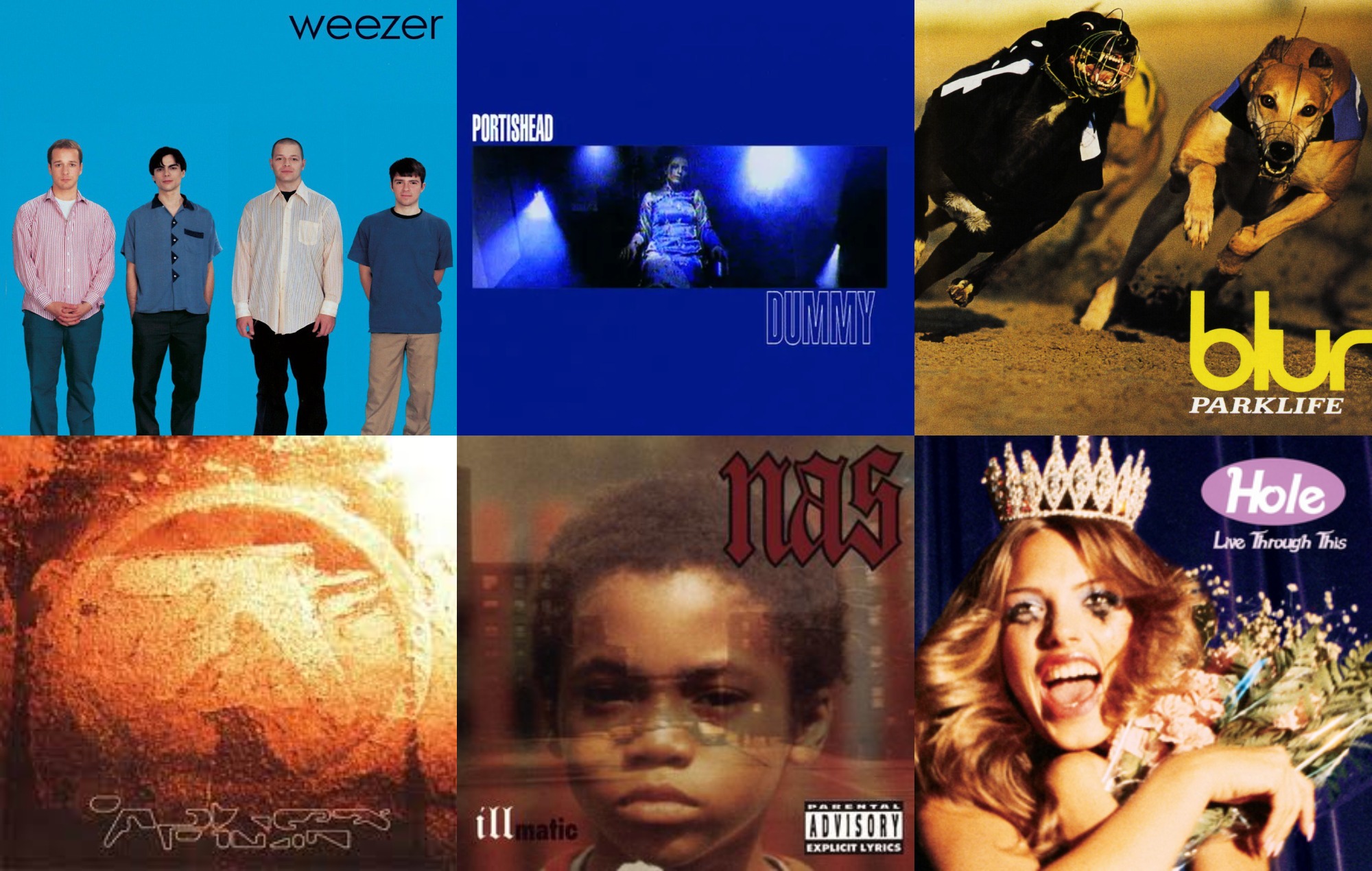Some seismic shifts took place in the music world in 1994. After Kurt Cobain’s death rocked the world early in the year, grunge’s grip on music fans was loosened and new sounds took its place, from Britpop to rave to US punk. Woodstock returned to the festival circuit for a historic, mud-soaked weekend, while the likes of Oasis, Nine Inch Nails, and more all had their big breakthroughs. Here are 25 albums from 1994 that turn 30 in 2024.
Additional Words: Thomas Smith
Tori Amos – ‘Under The Pink’
When: January 31
On her second album, ‘Under The Pink’, Tori Amos put her blinkers on to the fame her debut had brought her and got raw. The record tackled numerous difficult subjects, from female genital mutilation on hit single ‘Cornflake Girl’, to losing a friend to an abusive relationship on ‘Bells For Her’.
What happened next: ‘Under The Pink’ was declared one of the best albums of the ‘90s by many and secured Amos’ position as a songwriter with soul and grit. Yet more acclaimed works followed, including 1996’s ‘Boys For Pele’, and more recently, 2021’s ‘Ocean To Ocean’.
Green Day – ‘Dookie’
When: February 1
Green Day made their major label debut with their third album ‘Dookie’ in 1994 but didn’t lose the punk edge of their previous two releases. The record went on to define ‘90s pop-punk and, with the likes of ‘Welcome To Paradise’ and ‘Basket Case’, swung rock’s pendulum away from grunge and safely into the sub-genre.
What happened next: Fittingly for a band whose album defined a decade, Green Day became superstars. Their popularity waned towards the end of the ‘90s, but they reignited the world’s love for them with ‘American Idiot’ in 2004.
Pavement – ‘Crooked Rain, Crooked Rain’
When: February 14
After becoming indie darlings with debut album ‘Slanted And Enchanted’, Pavement returned in 1994 with a slightly more accessible sound – without losing the charm that made their first record so special. The album was made as the band was in transition, not just in style, but in line-up, following the departure of drummer Gary Young.
What happened next: Pavement continued to keep the world on its toes and became bona fide cult heroes over the course of two further albums. They broke up in 1999, before reuniting in 2010 and again in 2022.
Beck – ‘Mellow Gold’
When: March 1
Beck’s ‘Loser’ – an irony-laden megahit – picked up where Nirvana’s ‘Smells Like Teen Spirit’ left off: lyrical eye-rolls that encapsulated Gen X’s mid-’90s malaise. His third album, which that song opened, does not cower in the shadows, as ‘Beercan’, ‘Pay No Mind (Snoozer)’ and ‘Steal My Body Home’ proved.
What happened next: His 1996 album ‘Odelay’ is widely considered one of the decade’s defining records and Beck has remained steady in his output since: 1998’s ‘Midnite Vultures’ and 2002’s ‘Sea Change’ are equally irresistible. TS
Aphex Twin – ‘Selected Ambient Works Volume II’
When: March 7
Three decades on, Richard D. James’ second studio album remains beguiling. Following the spacey but danceable ‘Selected Ambient Works 85-92’, this 24-song epic – with a running time of over two hours – is dense ambient music inspired by lucid dreaming. It was deliberately unmarketable and debate still rages on where some of the songs start and finish and even what their titles are. You sense he revelled in the chaos.
What happened next: The two records that followed – 1995’s ‘I Care Because You Do’ and 1996’s ‘Richard D. James’ – were intense, and his work since the turn of the millennium has been sporadic but brilliant. In 2023, he released an EP and continued to tour his mind-melting DJ sets. TS
Soundgarden – ‘Superunknown’
When: March 8
Although Soundgarden had already been around for a decade before releasing their fourth album, it wasn’t until ‘Superunknown’ that the band scored their big breakthrough. The record married their heavy approach, while bringing in disparate new influences, to create genre-defining songs like ‘Black Hole Sun’.
What happened next: Soundgarden became grunge icons thanks to the record and finally secured mainstream success. It was short-lived, with the band breaking up in 1997 before ultimately reuniting in 2010. They remained together until Chris Cornell’s death in 2017.
Nine Inch Nails – ‘The Downward Spiral’
When: March 8
Nine Inch Nails never do anything by halves and the same could be said of their second album, ‘The Downward Spiral’, which took the idea of a concept album and fully committed to it. The record followed the descent of a man to his breaking point and subsequent suicide, viscerally capturing the emotions and horrors that accompanied that journey.
What happened next: The album brought huge success NIN’s way but also put frontman Trent Reznor on his own downward spiral with addiction and depression. Johnny Cash would go on to cover the record’s ‘Hurt’ in 2002, giving it a new lease of life, while the band and Reznor would become highly regarded for their work not just in the industrial field but Reznor’s film scores too.
Morrissey – ‘Vauxhall And I’
When: March 14
Morrissey had parted ways with The Smiths some years before the release of his fourth solo album ‘Vauxhall And I’, but the record was his first that really solidified his place as a star in his own right. Across the album, he refined his brand of poetic heartache, offering up gems of observations on life and his position in the spotlight.
What happened next: Morrissey moved to LA in 1995 and released two further albums before scoring a career resurgence in 2004 with ‘You Are The Quarry’. However, allegations of racism – which he has denied – have dogged him since, and more recently he’s struggled with labels and unreleased albums.
Hole – ‘Live Through This’
When: April 12
Hole polished up on their second album ‘Live Through This’, which frontwoman Courtney Love said she wanted to shock listeners who thought the band didn’t “have a soft edge”. Despite more melodic presentations, the record still tackled weighty topics, from anti-elitism to violence against women.
What happened next: Bassist Kristen Pfaff died shortly after the record’s release, with Melissa Auf der Maur filling her spot. Two years later, Hole shared their most successful album ‘Celebrity Skin’ but split in 2002. They reunited in 2009, but broke up again in 2013.
Nick Cave & The Bad Seeds – ‘Let Love In’
When: April 18
The band’s run of albums in the mid-’90s were, quite frankly, as good as it gets. 1994’s ‘Let Love In’ kicked things off, showcasing a sound that would get progressively heavier, more intense but, curiously, would soon bring them sustained commercial success. Its centrepiece ‘Red Right Hand’ was notably chosen as the theme music for BBC’s gangster drama Peaky Blinders.
What happened next: The good form continued on ‘Murder Ballads’ and ‘The Boatman’s Call’, both of which are equally celebrated. Their most recent records ‘Skeleton Tree’ (2016) and ‘Ghosteen’ (2019) are astonishing meditations of loss and grief. TS
Nas – ‘Illmatic’
When: April 19
Nas named his debut album ‘Illmatic’ as both a nod to his friend Illmatic Ice and to the gold contained within the record, living up to the title’s meaning of “beyond ill”. The then-rising star used the tracks to depict and explore his experiences growing up in Queens, New York, bringing his story vividly to life.
What happened next: While ‘Illmatic’ might not have sparked huge sales on its first release, it’s now considered one of the greatest records in the East Coast hip-hop canon, and its creator one of the scene’s biggest legends.
Blur – ‘Parklife’
When: April 25
On their third album, Blur became genuine contenders for the Britpop crown. The laddish chants of ‘Parklife’’s title track combined with the tenderness of ‘This Is A Low’ and ‘End Of A Century’ to present a band growing into and deepening their many facets.
What happened next: An almighty rivalry with fellow Britpoppers Oasis and an enduring legacy as one of Britain’s greatest bands. Frontman Damon Albarn reinvented himself as something of a renaissance man during the band’s break-up, but soon found his way back to Blur.
Weezer – ‘Weezer’
When: May 10
Also known as ‘The Blue Album’, Weezer’s self-titled first album has become a prevailing icon of geek-rock since its release three decades ago. Despite the world being submerged in grunge-mania at the time, the band’s wiry work with producer (and The Cars legend) Ric Ocasek helped them break through the sludgy riffs with a charming, harmonious awkwardness.
What happened next: The geeks triumphed, with ‘Weezer’ becoming a multi-platinum hit and setting the tone for more angular anthems on second album ‘Pinkerton’. After a hiatus, the band returned in 2001, adding a heavier edge to their sound.
Beastie Boys – ‘Ill Communication’
When: May 31
Beastie Boys might now be synonymous with merging hip-hop with other sounds like punk and jazz, but it wasn’t until ‘Ill Communication’ that they really made that eclectic spirit their calling card. The results birthed tracks both gigantic and glorious, from the juddering howls of ‘Sabotage’ to the flute-laden ‘Sure Shot’.
What happened next: Big, big things, from Grammys wins to being recognised for their unique music videos, arena tours to yet more landmark albums like 2004’s ‘To The 5 Boroughs’. In 2012, Adam “MCA” Yauch died from cancer and Mike D and Ad-Rock pledged never to make music under the Beastie Boys name again.
The Prodigy – ‘Music For The Jilted Generation’
When: July 4
At the time of the release of The Prodigy’s second album, rave culture in the UK was being cracked down on by the authorities. That didn’t stop ‘Music For The Jilted Generation’ from becoming a runaway success, topping the charts in the UK and soundtracking nights out for many in 1994.
What happened next: The Prodigy became household names on follow-up ‘The Fat Of The Land’, thanks to singles like ‘Firestarter’ and ‘Breathe’. They continued their reign as the UK’s premier dance group across four more albums, before Keith Flint’s death in 2019. The surviving members continue to light up festivals and venues around the world with their live set today.
Portishead – ‘Dummy’
When: August 22
It’s not often a debut album is credited with popularising a whole genre, but Portishead’s first effort, ‘Dummy’, is often cited as the spark behind trip-hop’s breakthrough moment. The record would also go on to become closely tied to Bristol and the sound emerging from the city, casting a leftfield and woozy image over the city.
What happened next: The band would release only two further records – 1997’s ‘Portishead’ and 2008’s ‘Third’ – and dip in and out of hiatus. Most recently, they reformed in 2022 to perform together for the first time in seven years at a War Child UK benefit show.
Jeff Buckley – ‘Grace’
When: August 23
At the time of release, Jeff Buckley’s ‘Grace’ didn’t make much of a splash. Critics weren’t won over and neither were the public. Since then, though, the record has become something of a slow-burner, gradually making its way into people’s hearts and landing spots on several Best Albums of All Time lists.
What happened next: ‘Grace’ was to be Buckley’s only studio album released in his lifetime. While working on a follow-up in 1997, he drowned in the Mississippi River at the age of 30.
Manic Street Preachers – ‘The Holy Bible’
When: August 30
Manic Street Preachers’ last album with guitarist and lyricist Richey Edwards was also one of their best. On the songs that made up ‘The Holy Bible’, the songwriter explored global politics, mental health and the anguish of humanity with his bandmates, setting their vital observations to roaring punk, post-punk and glam.
What happened next: Six months after the album was released, Edwards went missing and was eventually officially presumed dead in 2008. After taking a six month break following their bandmate’s disappearance, Manics regrouped in late 1995 and continued, with the blessing of Edwards’ family. They have released 11 albums since ‘The Holy Bible’, often still speaking out against political issues in their music, as they did with their former guitarist.
Oasis – ‘Definitely Maybe’
When: August 30
Everything about ‘Definitely Maybe’ was iconic, from its stellar tracklist of banger after banger, to its cover, the band’s interviews around it, and their live shows in 1994. It was one of the records that played a big part in propelling Britpop forward and out of the shadows of America’s grunge, and set up Oasis as a band about to go truly supersonic.
What happened next: A whole rollercoaster of rivalries – with other bands and between themselves. While still reigning over the world, Oasis broke up in 2009 minutes before they were due to headline Rock en Seine, and Noel and Liam have remained at each other’s throats ever since.
The Cranberries – ‘No Need To Argue’
When: October 3
‘Zombie’ was one of 1994’s biggest hits. It topped the charts in their native Ireland, Germany, Australia and beyond, helping the album onto selling a whopping 5 million copies in the space of six months. Beyond that ‘Ode To My Family’, ‘Dreaming My Dreams’ are up there with some of the band’s most accomplished compositions.
What happened next: Extensive commercial success followed, though the band took a lengthy hiatus in the mid-’00s. Lead singer Dolores O’Riordan died in 2018 and the group subsequently disbanded. TS
The Notorious B.I.G. – ‘Ready To Die’
When: September 13
The Notorious B.I.G. introduced himself in ’94 with an album that let the world into his life. In part, ‘Ready To Die’ was an autobiographical account of Biggie’s misspent youth and, along with Nas’ ‘Illmatic’, breathed new life into New York’s hip-hop scene.
What happened next: After scoring huge success with ‘Ready To Die’, the rapper recorded its follow-up, ‘Life After Death’. Tragically, Biggie was shot dead at the age of 24, weeks before that album was set to be released.
R.E.M. – ‘Monster’
When: September 27
‘Monster’ is R.E.M.’s grit in the oyster. After worldwide success with ‘Out of Time’ and ‘Automatic For The People’, the group returned with ‘Monster’, a challenging and often misunderstood record. It encouraged the band to head out on the road for their first run of performances in over five years.
What happened next: Following 1996’s ‘New Adventures In Hi-Fi’, R.E.M’s material took a steady decline; they eventually called it quits in 2011. As of 2023, Michael Stipe was working on new solo material. TS
Nirvana – ‘MTV Unplugged in New York’
When: November 1
Some live albums might achieve fan favourite status, but it’s rare for them to be as highly regarded as Nirvana’s ‘MTV Unplugged in New York’. Recorded for MTV’s acoustic concert series, the record stripped back the band’s anthems and showcased the beauty in their bones, and featured some beloved covers of songs by David Bowie, Lead Belly and more.
What happened next: Kurt Cobain died seven months before the record was released and bandmates Dave Grohl and Krist Novoselic went their separate ways. Grohl formed Foo Fighters, while Novoselic largely focused on activism.
TLC – ‘CrazySexyCool’
When: November 15
After making a strong start with their debut album in 1991, TLC made an about-turn in 1994 with ‘CrazySexyCool’. Leaving the rap roots of the group behind, they ventured more into R&B and soul, underpinning timeless hits like ‘Creep’ and ‘Waterfalls’ with hip-hop beats, and paving the way for the trio’s evolution into the R&B icons of 1999’s ‘FanMail’.
What happened next: ‘FanMail’ was another critical and commercial success, but it couldn’t stop the members from feuding with each other. Although they eventually made up, they wouldn’t make another album together, with Lisa “Left-Eye” Lopes dying in a car crash in 2002.
The Stone Roses – ‘Second Coming’
When: December 5
The record that destroyed the band. Following the success of their 1989 debut, the recording of its follow-up was fraught with legal battles, internal drama and the weight of expectation. ‘Second Coming’ has some moments of brilliance, mind: ‘Love Spreads’ and ‘Ten Storey Love Song’ can hang with their best material.
What happened next: Unsurprisingly, the band split two years later amid acrimonious circumstances. Their reunion in 2011 shocked the world and they toured the festival circuit until 2017 and recorded two new songs. In early 2024, guitarist John Squire announced a collaborative album with Oasis frontman Liam Gallagher. TS
The post These classic 1994 albums all turn 30 this year appeared first on NME.




